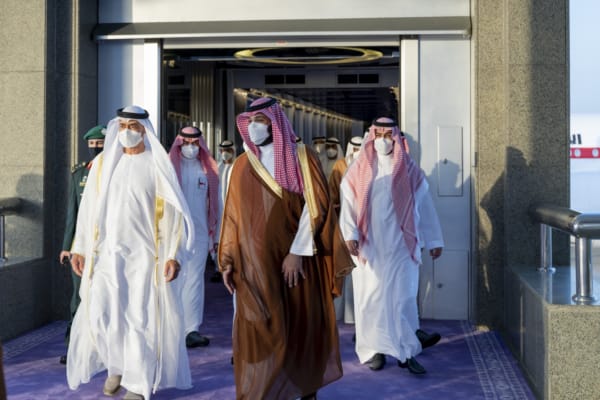NEW DELHI: Arab unity can be pretty fickle. Allies and friends fall apart, squabble and get back together again before something else triggers a falling out. A case in point are remarks attributed to Saudi Crown Prince Mohammed bin Salman who reportedly told some journalists last December, that the UAE “has stabbed us in the back.”
It gave credence to rumours in the region that the two leaders, Salman and the UAE’s Mohammand bin Zayed al Nahyan, close allies in the war in Yemen, were no longer close or allies. The latter did not turn up for the first China-GCC summit meeting in Riyadh when Salman made those remarks. West Asia analysts point out that the UAE ruler has for some time been sending other royals such as Dubai’s ruler Sheikh Mohammed bin Rashid Al Makhtoum who have royal standing but no political clout, to deal with his Saudi counterpart both at bilateral and multi-level functions. The reasons for this are simple – competition and increasingly diverging interests.
Hints of this first emerged when the UAE reportedly threatened to pull out of Opec plus in April 2020 over being reprimanded by Riyadh for exceeding its production quota. Though no public statement was made the fact that Saudi press reports itself acknowledged the Emiratis frustration over quotas they did not believe in. For now though, the UAE remains in OPEC.
Yemen is another matter. The UAE has withdrawn all its troops from Yemen leaving the Saudis to do the fighting. Former diplomat and ambassador to Riyadh Talmiz Ahmad, points out that Abu Dhabi in a major volte-face in 2016, moved away at the behest of the Americans from fighting the Houthis to fighting Al Qaeda forces in southern Yemen. This came as a big shock to the Saudis who have secretly been working with Al Qaeda to fight the Houthis.
Ahmad says Riyadh would like to see the defeat of the Houthis and a united Yemeni government under exiled president Abd-Rabbu Mansour Hadi.
“But Abu Dhabi has been backing the STC (Southern Transitional Council) which wants a separate north and south Yemen. This suits the UAE as it ensures that its key Red Sea shipping lanes and bases that it holds in the Horn of Africa are safeguarded. It has also funded and placed proxy militant groups along Yemen’s coastline to achieve this aim, something that does not sit well with the Saudis.”
The other fallout between the two nations is over Sudan. Initially, observers pointed out both nations were on the same page supporting General Burhan and Dagalo against former prime minister Abdalla Hamdok, who resigned in January 2022. It is during the power struggle that both nations’ stances have differed sharply with Saudi Arabia and Egypt supporting Burhan while the UAE has sought to support Dagalo.
“Dagalo has promised to crack down on Islamist groups in the country most specifically those who support the Muslim Brotherhood and he has promised to safeguard a $6 billion agreement signed between Sudan and the UAE that would allow the construction of a port on the Red Sea coast. The UAE wants this as it gives them a unique vantage point in the Horn of Africa. This however goes against Saudi strategic interests and threatens MbS’s vision of being a regional player,” said Ahmad.
Add to that, a China-brokered pact has tied Saudi Arabia to Iran while the UAE has enhanced ties with Israel. The divergence is not expected to be like the Riyadh-Qatar falling out in 2017 which saw the former leading a coalition to blockade the country. But given that there is no direct communication between Salman and Nahyan for some time now, there’s no telling what form or direction this rivalry could take.
















